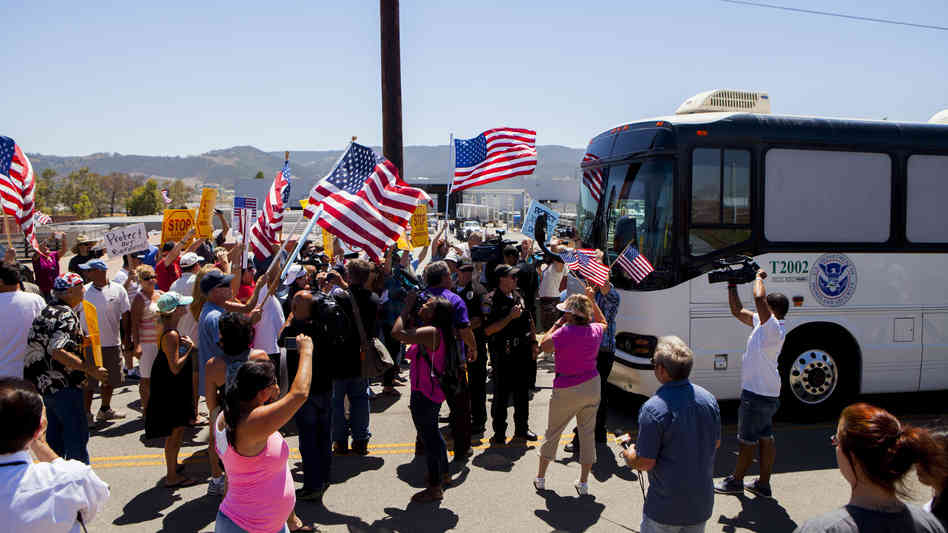The hashtag #6wordtestimonies has been picking up steam on Twitter as many share their sometimes melancholic or inspirational immigration experience in just 6 words.
And a clever YouTube video demonstrating how average Americans would fail a US citizenship test went viral in just a few weeks.
These are some of the recent tactics Tony Hernandez, President and CEO of Latino Broadcasting Company (LBC), has used to bring attention to what immigrants of all walks of life encounter when they arrive at the U.S. His larger initiative, the Immigrant Archive Project (IAP) has been capturing testimonies of immigrants from around the country, from well-known celebrities to ordinary citizens who share their family story.
The immigrant story is as quintessentially American as the 4th of July, said Hernandez. “America has from its very founding continued to be fueled by immigrants,” pointing out the impact that Albert Einstein, Alexander Graham Bell and Andrew Carnegie have had in history.
Hernandez has traveled across the US, visiting New York, Washington DC, Los Angeles, Chicago, San Antonio, Austin, Dallas, and Houston and conducted lengthy on-camera interviews, which are later edited into short testimonies, not more than a couple of minutes, at LBC’s headquarters in Miami.
It all started around 2008, when Hernandez felt the conversation about immigration took a negative turn. It was contradictory to the experience he had, after immigrating from Cuba with his parents at age 5.
Growing up in the immigrant-dominated city of Union City, New Jersey, Hernandez said most kids around him had parents who were blue-collar workers. Yet despite the hardships, the majority of those children went to college and are professionals today.
“This group that arrived with a tremendous disadvantage really took advantage of the opportunity this country has given them,” said Hernandez. As a young child he constantly heard stories around the dinner table about the difficulties newly arrived immigrants faced and the drive they had to work and prosper.
“So I just came up with this crazy idea. What if I can give access to everyone to these dinner table conversations that I had access to growing up,” said Hernandez.
“So I just came up with this crazy idea. What if I can give access to everyone to these dinner table conversations that I had access to growing up,” he said. With the IAP he gives the audience a first hand account of what motivates and fuels those who work countless hours in the hopes of giving their children a better future. He pointed out how going to college was imperative in his family and among his peers.
“I think today the country as a whole can take a page from that immigrant playbook and understand that with one generation you can literally make an exponential leap forward,” Hernandez explained.
Hernandez stressed that previous waves of immigrants faced initial resistance from other Americans. As these immigrants assimilated, it is now their children and grandchildren who forget their families’ stories are very similar to those coming to the country today. With the IAP, Hernandez is trying to break that cycle of negativity.
One of the ways he does this is by incorporating a diverse array of Americans who were not born in the U.S. – from celebrities to CEOs to farmworkers. When asked which is his favorite interview, he said it would be like asking him to choose a favorite child. “It’s the stories of everyday hardworking people that really move me the most,” he said.
Hernandez’ work has been recognized by different organizations; he sits on the honorary board of Mark Zuckerberg’s Welcome.us, and has received the Impact Award from the National Hispanic Media Coalition, the Lexus Pursuit of Perfection Award and the Lupe Ontiveros Indomitable Spirit Award.
But perhaps one of the more special moments was when Hernandez received a humanitarian award from the World Church Service. Coincidentally, this ended up being the same church that helped Hernandez and his parents with $100 to help get them off their feet when they arrived from Cuba. After his father found a job, he returned the $100 and asked the church to give the money to a newly arrived immigrant family.
Source Article from http://feeds.nbcnews.com/c/35002/f/663303/s/3c2d2afa/sc/38/l/0L0Snbcnews0N0Cnews0Clatino0Cimmigrant0Earchive0Eproject0Erecords0Elives0Emade0Eamerica0En144976/story01.htm
Our Immigrant History, In People's Own Words
http://feeds.nbcnews.com/c/35002/f/663303/s/3c2d2afa/sc/38/l/0L0Snbcnews0N0Cnews0Clatino0Cimmigrant0Earchive0Eproject0Erecords0Elives0Emade0Eamerica0En144976/story01.htm
http://news.search.yahoo.com/news/rss?p=immigrant
immigrant – Yahoo News Search Results
immigrant – Yahoo News Search Results



